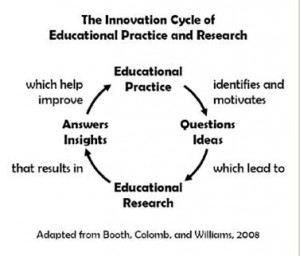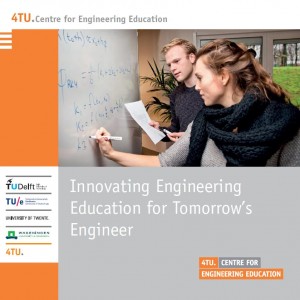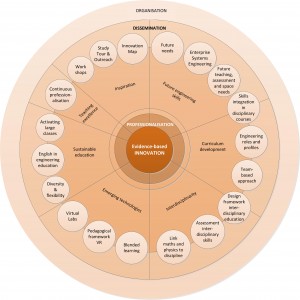What do we learn from trial and error?
 Innovating curricula is about designing effective learning and teaching environments in continual cycles of educational practice and research. That’s what I have always learned in theory. But I have been curious why the professors and lecturers take very different approaches when they do research in their field of engineering or in their education. The structured process they follow when they aim to advance engineering knowledge and understanding through defining research questions, identifying hypotheses, collecting information and data for the purpose of making decisions, and testing those hypotheses, seems gone when they investigate how to enhance their teaching. The structured methodology is then often replaced by an unstructured trial-and-error process by producing prototype courses and improving them on the run.
Innovating curricula is about designing effective learning and teaching environments in continual cycles of educational practice and research. That’s what I have always learned in theory. But I have been curious why the professors and lecturers take very different approaches when they do research in their field of engineering or in their education. The structured process they follow when they aim to advance engineering knowledge and understanding through defining research questions, identifying hypotheses, collecting information and data for the purpose of making decisions, and testing those hypotheses, seems gone when they investigate how to enhance their teaching. The structured methodology is then often replaced by an unstructured trial-and-error process by producing prototype courses and improving them on the run.
Oh yes, I am very much aware that research in engineering and technology is very different from research in didactics. It is more a social sciences sort of thing. Still, that does not explain why hardly ever the innovation cycle in education, as shown in the picture above, is followed. Not very often evidence-based results are reported and disseminated either, while the slogan in research is “publish or perish”. And thus, to say it mildly, there is space for improvement in the learning from each others’ successes and failures in engineering education. If this sounds familiar to you, please continue reading.
The 4TU. Centre for Engineering Education
To help mitigating this issue, the three Executive Boards of the technical universities in the Netherlands, TU Delft, TU Eindhoven and University Twente, decided to start a collaboration on engineering education in 2014. And I was invited to help shaping this collaboration as one of the six board members (two per university). For all six the setting up of this new “business” was an unknown world, a rare opportunity and a new challenge: building a brand new organisational body that represents the three technical universities, starting from a blank sheet of paper with seed funding till 2018. It had to become a business for co-creators, our “customers” in the universities, who are already heavily loaded with work. Organisation, name, plan of action. Nothing existed yet. Where should we begin?
The framework we got from our Executive Boards contained two directives. The organisational body should:
- support and research innovations in engineering education that are taking place at the three universities in the Netherlands, and
- share the expertise on our educational innovations, thus supporting our international standing with respect to the high quality of engineering education.
 I will not bore you too much with the history, although it would have been very short. We decided to build on networking models to loosely connect teachers, educational researchers and support staff, and involve international colleagues in our research or innovations when appropriate. We made two categories of activities: distributed work packages that are jointly performed by the three universities together, and local work packages that are performed in one institution and whose results are disseminated upon completion. Last but not least we agreed upon its name: the 3TU.Centre for Engineering Education (3TU.CEE), which was renamed in 4TU.CEE in summer 2016 when the fourth and last technical university of the Netherlands joined, the Wageningen University & Research.
I will not bore you too much with the history, although it would have been very short. We decided to build on networking models to loosely connect teachers, educational researchers and support staff, and involve international colleagues in our research or innovations when appropriate. We made two categories of activities: distributed work packages that are jointly performed by the three universities together, and local work packages that are performed in one institution and whose results are disseminated upon completion. Last but not least we agreed upon its name: the 3TU.Centre for Engineering Education (3TU.CEE), which was renamed in 4TU.CEE in summer 2016 when the fourth and last technical university of the Netherlands joined, the Wageningen University & Research.
Mission of 4TU Centre for Engineering Education:
“To jointly inspire, stimulate, support and disseminate effective and high-quality engineering education through research-based innovations”
Our achievements and experiences in the first two years
 We focus our work on topics that are unique for Engineering Education, although this is never a black-and-white thinking. We have set up the network model. In the distributed work packages we researched and reported about a comparison of Bachelor curriculum reconstructions that had taken place simultaneously, but independently from each other, in all three technical universities in 2011-2012. We also developed an online Innovation Map to make innovations and research results searchable and available for anybody within and outside the centre who has an internet connection. And last but not least we explored the characteristics of teaching and assessing multi- and interdisciplinary courses and projects. Jointly we organised the highly successful CDIO European Regional Meeting 2016 in Delft, attracting an all-time high of more than 160 participants. On local level many different activities took place that were fit for purpose for each university. You can read about our achievements in the first two years in our Progress Report.
We focus our work on topics that are unique for Engineering Education, although this is never a black-and-white thinking. We have set up the network model. In the distributed work packages we researched and reported about a comparison of Bachelor curriculum reconstructions that had taken place simultaneously, but independently from each other, in all three technical universities in 2011-2012. We also developed an online Innovation Map to make innovations and research results searchable and available for anybody within and outside the centre who has an internet connection. And last but not least we explored the characteristics of teaching and assessing multi- and interdisciplinary courses and projects. Jointly we organised the highly successful CDIO European Regional Meeting 2016 in Delft, attracting an all-time high of more than 160 participants. On local level many different activities took place that were fit for purpose for each university. You can read about our achievements in the first two years in our Progress Report.
One local activity in Delft that got significant outreach and impact was about my research and vision development on the future engineering skills (publication “Engineering Education in a Rapidly Changing World”; 2nd revised edition). It sparked the “Free Spirits” Think Tank at TU Delft, initiated by TU Delft CEE Coordinator Renate Klaassen and me, in which the need for “different” professional profiles of engineers in 2030 were explored, including new concepts for their training and teaching (publication available here). Its results influence the current updating of TU Delft’s Vision on Education and the discussions about TU Delft’s Strategic Framework 2018-2024.
In this start-up phase I learnt that it takes quite some time and energy to find sufficient enthusiast people who are willing to make the extra mile to learn from change, instead of operating in an open-loop trial-and-error process to enhance their education. And this is true even when we offer to compensate the efforts with funds and support by experts or PhD students in education for doing the action research, reporting and dissemination. It needs perseverance. The limiting factor is often not the euros but the hours: time is the most scarce resource for many of our scientific staff.
But I am optimistic. Trends are positive. The importance of educational performance and continuous professionalisation in the annual appraisal cycle of the staff is increasing. The interest in new pedagogical methods that make use of new insights, such as the flipped classroom and blended learning, or emerging technologies such as virtual and augmented reality in the classroom, or the embedding of interdisciplinarity and integration of professional engineering skills in mono-disciplinary courses, is steadily growing.
The road ahead of us
In January 2017 the four Executive Boards gave us green light to continue our work for another five years. To avoid a scattering of activities and create as much impact as possible, we limit ourselves to themes and topics that we expect will be the ingredients in how engineering education will evolve. Virtual and augmented reality, future engineering skills, entrepreneurial behaviour, interdisciplinary education, mathematics & engineering integration and challenges that come with growing numbers of students and increasing diversity. The disk below and the Strategic Plan shows our full spectrum of themes and activities for 2017-2019.

Themes and activities by the 4TU Centre for Engineering Education 2017-2019
Interested?
Are you affiliated with one of our universities and are you looking for advice or support to innovate your course or programme, or do you want to experiment with new teaching or assessment methods. If they match with our chosen themes (please don’t think in black-and-white), feel free to contact the coordinator of your university. Collaborating with the 4TU.CEE gives you access to broad expert knowledge, educational research support, a broad network and an international platform to disseminate your results. With your work under the umbrella of the 4TU.CEE, you profile yourself and demonstrate actively that you take your continuous professional development in teaching serious. And I am confident this is going to count in the annual appraisal cycle more and more.
There is no need to say that we are not so much interested in unstructured open-ended prototyping of courses or programmes or expensive pilots that have only little value for colleagues in other faculties or universities. Our most important objective and assignment is to share and learn. You, we and the world of higher engineering education around us will only learn, when you make your work evidence based and share your results by reporting in a paper, presentation, seminar, or upload it in our Innovation Map. We can help you with this.
In case you are not affiliated with one the four TU’s then, if you are interested to learn from or together with us, join forces, share knowledge, want to co-create, then please feel free to contact me or one of the coordinators. We are eagerly looking for ways to expand our international network in Europe, and support and strengthen engineering education whenever and wherever we can.

This post has also been publised in the personal weblog about Engineering Education by Aldert Kamp.




